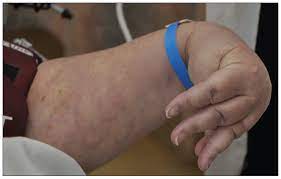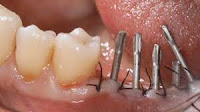Patient had bulimia and had lesion in palatal surface in upper teeth with recurrent vomiting. What is the type of lesion
Patient had bulimia and had lesion in palatal surface in upper teeth with recurrent vomiting. What is the type of lesion:
a- attrition
b- abrasion
c- erosion***
----------------------------
Bulimia nervosa, commonly called bulimia, is a serious and potentially fatal eating disorder. It is possible that people with bulimia secretly binge episodes, that is, eat large amounts of food and lose control of their diet, and then vomit, to try to get rid of extra calories in an unhealthy way.
To get rid of calories and avoid gaining weight, people with bulimia can use different methods. For example, they can induce vomiting regularly or use laxatives inappropriately, weight loss supplements, diuretics or enemas after the binge. Or they can use other ways to get rid of calories and avoid gaining weight, such as fasting, eating a strict diet or exercising excessively.
If you have bulimia, you probably worry about your weight and body shape. You may judge yourself severely and harshly for the defects you perceive you have. Since bulimia is related to the image of oneself, and not simply to food, it can be difficult to overcome. But effective treatment can help you feel better about yourself, adopt healthier eating patterns and reverse serious complications.
Symptom:
Signs and symptoms of bulimia may include the following:
- Worry about body shape and weight
- Live with fear of gaining weight
- Repeat episodes of eating excessive amounts of food at once
- Feel a loss of control during the binge, as if you could not stop eating or could not control what you eat
- Force vomiting or exercise too much to not gain weight after a binge
- Use laxatives, diuretics or enemas after eating when they are not necessary
- Fast, restrict calories or avoid certain foods between binge eating
- Use dietary supplements or excess herbal products to lose weight
The severity of bulimia is determined by the number of times a week you purge, usually at least once a week for at least three months.
When should you consult a doctor?
If you have symptoms of bulimia, seek medical attention as soon as possible. When left untreated, bulimia can have serious health effects.
Talk to the primary care provider or a mental health professional about the feelings and symptoms of bulimia. If you do not want to seek treatment, talk to someone about what is happening to you, it can be a friend, a loved one, a teacher, a religious leader or someone you trust. They can help you take the first steps to obtain a successful treatment against bulimia.
Help a loved one who has bulimia symptoms
If you think a loved one has symptoms of bulimia, talk to him openly and honestly about what worries you. You cannot force them to seek professional attention, but you can encourage and support them. You can also help them find a trained doctor or a mental health professional, ask for a consultation and even accompany them.
Since many of the people with bulimia are of normal weight or are slightly overweight, it may not be obvious to others that there is a problem. Warning signs that friends and family may notice include the following:
- Concern or constant complaints about being fat
- Distorted and excessively negative body perception
- Repetitive consumption of large amounts of food at one time, especially food that the person usually avoids
- Adoption of strict diets or fasting after overeating
- Refusal to eat in public or in front of other people
- Visits to the bathroom right after eating, during - meals or for long periods
- Excessive exercise
- The presence of sores, scars or calluses on the knuckles or hands
- Damage to teeth and gums
- The change in weight
- Swelling of the hands and feet
- Inflammation of the face and cheeks due to glandular enlargement
----------------------------
Bulimia nervosa, commonly called bulimia, is a serious and potentially fatal eating disorder. It is possible that people with bulimia secretly binge episodes, that is, eat large amounts of food and lose control of their diet, and then vomit, to try to get rid of extra calories in an unhealthy way.
To get rid of calories and avoid gaining weight, people with bulimia can use different methods. For example, they can induce vomiting regularly or use laxatives inappropriately, weight loss supplements, diuretics or enemas after the binge. Or they can use other ways to get rid of calories and avoid gaining weight, such as fasting, eating a strict diet or exercising excessively.
If you have bulimia, you probably worry about your weight and body shape. You may judge yourself severely and harshly for the defects you perceive you have. Since bulimia is related to the image of oneself, and not simply to food, it can be difficult to overcome. But effective treatment can help you feel better about yourself, adopt healthier eating patterns and reverse serious complications.
Symptom:
Signs and symptoms of bulimia may include the following:
- Worry about body shape and weight
- Live with fear of gaining weight
- Repeat episodes of eating excessive amounts of food at once
- Feel a loss of control during the binge, as if you could not stop eating or could not control what you eat
- Force vomiting or exercise too much to not gain weight after a binge
- Use laxatives, diuretics or enemas after eating when they are not necessary
- Fast, restrict calories or avoid certain foods between binge eating
- Use dietary supplements or excess herbal products to lose weight
The severity of bulimia is determined by the number of times a week you purge, usually at least once a week for at least three months.
When should you consult a doctor?
If you have symptoms of bulimia, seek medical attention as soon as possible. When left untreated, bulimia can have serious health effects.
Talk to the primary care provider or a mental health professional about the feelings and symptoms of bulimia. If you do not want to seek treatment, talk to someone about what is happening to you, it can be a friend, a loved one, a teacher, a religious leader or someone you trust. They can help you take the first steps to obtain a successful treatment against bulimia.
Help a loved one who has bulimia symptoms
If you think a loved one has symptoms of bulimia, talk to him openly and honestly about what worries you. You cannot force them to seek professional attention, but you can encourage and support them. You can also help them find a trained doctor or a mental health professional, ask for a consultation and even accompany them.
Since many of the people with bulimia are of normal weight or are slightly overweight, it may not be obvious to others that there is a problem. Warning signs that friends and family may notice include the following:
- Concern or constant complaints about being fat
- Distorted and excessively negative body perception
- Repetitive consumption of large amounts of food at one time, especially food that the person usually avoids
- Adoption of strict diets or fasting after overeating
- Refusal to eat in public or in front of other people
- Visits to the bathroom right after eating, during - meals or for long periods
- Excessive exercise
- The presence of sores, scars or calluses on the knuckles or hands
- Damage to teeth and gums
- The change in weight
- Swelling of the hands and feet
- Inflammation of the face and cheeks due to glandular enlargement
Causes:
The exact cause of bulimia is unknown. Many factors can influence the development of eating disorders, including genetics, biology, emotional health, social expectations and other aspects.
Risk factor's:
Girls and women are more likely to have bulimia than boys and men. Generally, bulimia begins during the last years of adolescence and the beginning of adulthood.
Factors that may increase the risk of bulimia include the following:
- Biology. People with first-degree relatives (siblings, parents or children) with an eating disorder may be more likely to develop an eating disorder, indicating a possible genetic link. Being overweight during childhood or adolescence can increase the risk.
Psychological and emotional problems Psychological and emotional problems, such as depression, anxiety disorders or substance use are closely linked to eating disorders. People with bulimia may have negative feelings about themselves. In some cases, traumatic events and environmental stress may be contributing factors to the disease.
- Diet People who follow diets have a higher risk of developing eating disorders. Many people with bulimia severely restrict calories between binge-eating episodes, which can trigger a need to eat compulsively again and then purge. Other triggers for binge eating include stress, poor body self-image, food and boredom.
Complications:
Bulimia can cause numerous serious complications that can even be life-threatening. Possible complications include the following:
- Negative self-esteem and problems with relationships and social functioning
- Dehydration, which can lead to important medical problems, such as kidney failure
Heart problems, such as irregular heartbeat or heart failure
- Severe tooth decay and gum disease
- Absent or irregular periods in women
- Digestive problems
- Anxiety, depression, personality disorders or bipolar disorder
- Alcohol or drug abuse
- Self-harm, suicidal thoughts or suicide
Prevention:
Although there is no sure way to prevent bulimia, you can guide the person toward healthy behavior or seek professional treatment before the situation gets worse. How can you help:
- Promotes and reinforces a healthy body image for your children, regardless of size or shape. Help them build trust in ways that have nothing to do with appearance.
- Enjoy family meals on a regular basis.
- Do not talk about home weight. Instead, focus on having a healthy lifestyle.
- Discourages diets, especially when they include unhealthy weight management behaviors, such as fasting, consumption of supplements or laxatives for weight loss or self-induced vomiting.
- Talk to the primary health care provider. This professional can identify the first indicators of an eating disorder and help prevent its development.
- If you notice that a family member or friend has problems with food that could cause or indicate an eating disorder, try to talk to them about these problems and ask them how you can help.







%20tube%20has%20stopped%20draining..%20Notify%20the%20physician.jpg)